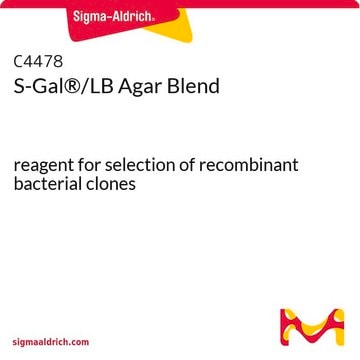B3928
Blue-White Select™ Screening Reagent
for selection of recombinant bacterial clones
Synonym(s):
Blue-White Reagent, Screening Reagent, Selection Reagent
Sign Into View Organizational & Contract Pricing
All Photos(1)
About This Item
UNSPSC Code:
12352200
NACRES:
NA.85
Recommended Products
grade
for molecular biology
Quality Level
form
liquid
usage
sufficient for 125 dishes (90 mm)
technique(s)
nucleic acid detection: suitable
suitability
suitable for nucleic acid staining
shipped in
dry ice
storage temp.
−20°C
General description
Sigma′s Blue-White Select™ Screening Reagent is a chromogenic substrate for β-galactosidase, used to determine the presence or absence of a cloned DNA insert in bacteria growing on agar plates. Blue-White Select™ Screening Reagent is designed for blue-white selection of recombinant bacterial colonies with the lac+ phenotype.
Features and Benefits
- Intense color contrast for easy colony selection
- Convenient, ready-to-use solution
Components
40 mg/mL IPTG
40 mg/mL X-Gal
(prepared in DMSO)
40 mg/mL X-Gal
(prepared in DMSO)
Principle
When Blue-White Select™ Screening Reagent is cleaved by β-galactosidase, the resulting product will form a blue precipitate. Lac+ colonies grown in the presence of Blue-White Select™ Screening Reagent remain white in color, allowing for easy differentiation between lac+ and lac- colonies.
The technique is based on vectors such as the pUC and the M13mp series that carry a fragment of the β-galactosidase gene encoding an a-fragment of β-galactosidase. Exploitation of these vectors requires use of a bacteria strain carrying the complementing gene fragment to allow the assembly of an active complex, resulting in the formation of blue colonies. Disruption of the ß-galactosidase gene by insertion of a DNA fragment into the vector′s multiple cloning site results in the loss of functional β-galactosidase activity; these colonies remain white, allowing for easy differentiation between lac+ and lac- colonies.
The technique is based on vectors such as the pUC and the M13mp series that carry a fragment of the β-galactosidase gene encoding an a-fragment of β-galactosidase. Exploitation of these vectors requires use of a bacteria strain carrying the complementing gene fragment to allow the assembly of an active complex, resulting in the formation of blue colonies. Disruption of the ß-galactosidase gene by insertion of a DNA fragment into the vector′s multiple cloning site results in the loss of functional β-galactosidase activity; these colonies remain white, allowing for easy differentiation between lac+ and lac- colonies.
Legal Information
Blue-White Select is a trademark of Sigma-Aldrich Co. LLC
related product
Product No.
Description
Pricing
Storage Class Code
10 - Combustible liquids
WGK
WGK 3
Flash Point(F)
188.6 °F
Flash Point(C)
87 °C
Personal Protective Equipment
dust mask type N95 (US), Eyeshields, Gloves
Certificates of Analysis (COA)
Search for Certificates of Analysis (COA) by entering the products Lot/Batch Number. Lot and Batch Numbers can be found on a product’s label following the words ‘Lot’ or ‘Batch’.
Already Own This Product?
Find documentation for the products that you have recently purchased in the Document Library.
Regulation of the Escherichia coli lac operon expressed in human cells.
Bioard, D.S. et al.
Biochimica et Biophysica Acta, 113, 68-74 (1992)
Ausubel, F.M., et al.
Current Protocols in Molecular Biology, 1-1 (1995)
Methylation of single-stranded DNA in vitro introduces new restriction endonuclease cleavage sites.
B Gronenborn et al.
Nature, 272(5651), 375-377 (1978-03-23)
D S Biard et al.
Biochimica et biophysica acta, 1130(1), 68-74 (1992-02-28)
We have investigated the use of various Epstein-Barr virus (EBV)-based vectors bearing the two components of the Escherichia coli lac operator-repressor (lacO, lacI) complex. Our aim was to develop a model system of gene expression by looking at the transcription
Characterization by in vitro complementation of a peptide corresponding to an operator-proximal segment of the beta-galactosidase structural gene of Escherichia coli.
A Ullmann et al.
Journal of molecular biology, 24(2), 339-343 (1967-03-14)
Our team of scientists has experience in all areas of research including Life Science, Material Science, Chemical Synthesis, Chromatography, Analytical and many others.
Contact Technical Service





